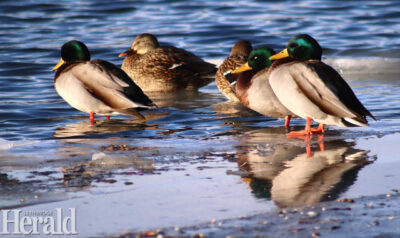City hoping to determine cause of waterfowl deaths
By Lethbridge Herald on January 17, 2022.
 Herald file photo by Al Beeber
A group of mallard ducks stand on the edge of the ice and open water recently at Henderson Lake. Dozens of waterfowl have been found dead this winter at Henderson Lake.
Herald file photo by Al Beeber
A group of mallard ducks stand on the edge of the ice and open water recently at Henderson Lake. Dozens of waterfowl have been found dead this winter at Henderson Lake.Al Beeber – Lethbridge Herald
A number of causes could be at play in the deaths of dozens of birds at Henderson Lake this winter.
Approximately 50 to 70 waterfowl, many mallard ducks, have been seen frozen into the ice of the lake or along shorelines.
Some of the carcasses are being taken to Calgary to hopefully find definitive causes of death, media were told in an online scrum Monday with Parks Operations Manager Hiroshi Okubo and Coreen Putman of the Helen Schuler Nature Centre.
Media was also told that Lethbridge College will soon be collecting some carcasses which will be sent to the Canadian Wildlife Health Co-operative in Calgary so definitive answers can be found.
All other carcasses are being bagged and taken to the landfill.
Okubo said for the last month starting in December a lot of dead waterfowl, mostly ducks, have been seen at the lake. But now dead geese are being noticed, as well.
A lot of City staff have been picking up the dead ducks and body parts of birds from edges around the shoreline. Predators such as crows, he said, have been observed eating body parts of the birds and an eagle has been spotted at Henderson for the second straight season.
With open water nearby, staff aren’t allowed on Henderson Lake ice to retrieve dead birds.
Okubo said the Parks department will probably have to wait for a change in weather to go out out onto the water in a boat to pick up the dead birds.
Putman said mass mortality events among waterfowl are not unheard of.
“They definitely happen more frequently in the winter time. . .at Henderson we do have variable ice conditions and so as the ice expands and the open water shrinks, one of the things that happens is the waterfowl that are utilizing Henderson Lake, there’s just less open water for them to sort of share.”
This can create overcrowding and with that come stresses such as a lack of available food, she said. Some birds could be enduring injuries inflicted upon them by more dominant ones.
“There also might be in those overcrowding situations disease. Often if one bird becomes diseased, it becomes that much easier to spread.
“And then certainly in terms of some of the things we’ve noticed over the course of the pandemic, one of the contributing factors in cities in urban areas to overcrowding in urban parks like Henderson Lake is artificial feeding,” she said.
Since the pandemic began, more people have been seen feeding birds and much of that food is lacking in proper nutrition with birds being given stuff like crackers, popcorn or bread.
“We have noticed over the last couple of years there has been an increase in the number of people engaging in feeding birds.”
“And so the birds are going into the winter season with really poor nutrition and with poor health,” she said.
And some may not be able to migrate when the trigger of cold weather hits because they aren’t healthy enough, she said.
And while that artificial feeding isn’t healthy, it does leave birds feeling full so they aren’t engaging in their natural foraging, Putnam added.
Mallards would normally eat aquatic vegetation, roots, stems and the seasonal seeds of the aquatic plants. They’d also be eating invertebrates including dragonfly larvae, crayfish and minnows.
“Those are really high in protein. They would also be eating some of the naturally occurring grains that some of the grasses seasonally produce so they eat a really varied diet.”
Putnam said some birds are choosing to delay migration, such as mallards who normally want to be the first on breeding territory. These birds are only moving as far south as they have too, she said.
“With that strategy, they’re trying to only move as far south as what they have to. And so with there being artificial feeding, they may be choosing not to fly south because they have that artificial food source.”
Follow @albeebHerald on Twitter
26-25



